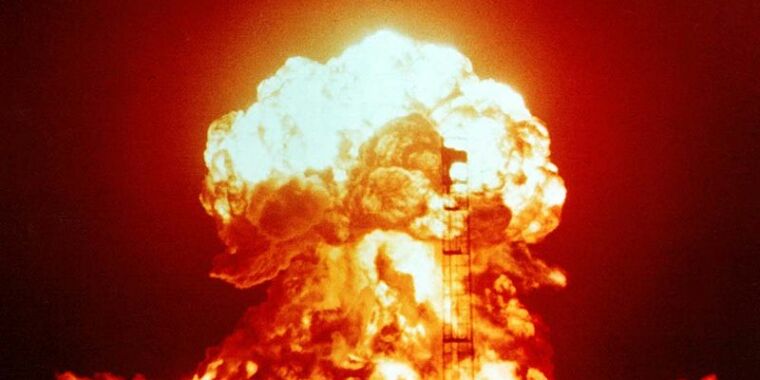
WarGames for real: How one 1983 exercise nearly triggered WWIII
From the archives: Say hello to the KGB software model that forecasted mushroom clouds.

For those that are interested, here is a link to that Able Archer TL in questions:Theres a rather incredible Able Archer ‘83 timeline on this site that covers this.
Yes, but things can get formalized as they’re passed upward.The nuclear false alarm a few weeks earlier was closer. But that too was unlikely to trigger a Soviet nuclear attack since it made no sense to anyone why America would initiate nuclear war with a few ICBMs. Again there’s no reason not to wait for confirmation. Had the duty officer reported it up the chain of command, Soviets would go on alert and senior leaders would be evacuated, but again immediate retaliation is unlikely.
We are living in the most probable timeline.
Yes, but things can get formalized as they’re passed upward.
And of course, if the Sept. 26 false alarm and the Petrov save had happened during November’s Able Archer— Ouch! That would have been bad.
We on the U.S. side did Able Archer every year.. . The way it actually happened I believe 1983 was not as dangerous as 1962.
why more about CW ? can CW impact air operations too ?From being in the middle of it at the time many of us felt that 'The Third World War, August 1985' by Sir john Hackett was the most likely scenario for a major NATO/WP war at the time and that as one side got desperate it would go nuclear. How far it would go was the big question. Personally I was more concerned about chemicals.
We had no real anti chemical capability that was good for more than a couple hours. Our personal decontamination kit (that we would use for spot decontamination) was a direct copy of a soviet kit that the Israelis captured from the Egyptions. Our M17 gasmasks (yes we were still issued M17s that didn't even have the drinking tube that the later M17A1 had) could not have new filters installed without taking them off then it was about an 8 minute process undoing small internal rubber flaps. Different filters were needed to protect against different chemicals. For example the filters for Nerve gas would be substantially degraded if there was exposure to blood agents. And yes the Soviets were known to mix the types of agents. Air defense isn't any good if your ground crew is all dead or incapacitated. Our chemical suits were a joke. They were only good for a few hours, no one knew if they would really be effective if they were cleaned (They were a multiple layer cloth, charcoal infused material, cloth construction. We didn't even have one for each person at the time. We all planned on using our oldstyle rubberized raingear and duct tape and hope we didn't collapse from heatstroke.why more about CW ? can CW impact air operations too ?
sobering assessmentWe had no real anti chemical capability that was good for more than a couple hours. Our personal decontamination kit (that we would use for spot decontamination) was a direct copy of a soviet kit that the Israelis captured from the Egyptions. Our M17 gasmasks (yes we were still issued M17s that didn't even have the drinking tube that the later M17A1 had) could not have new filters installed without taking them off then it was about an 8 minute process undoing small internal rubber flaps. Different filters were needed to protect against different chemicals. For example the filters for Nerve gas would be substantially degraded if there was exposure to blood agents. And yes the Soviets were known to mix the types of agents. Air defense isn't any good if your ground crew is all dead or incapacitated. Our chemical suits were a joke. They were only good for a few hours, no one knew if they would really be effective if they were cleaned (They were a multiple layer cloth, charcoal infused material, cloth construction. We didn't even have one for each person at the time. We all planned on using our oldstyle rubberized raingear and duct tape and hope we didn't collapse from heatstroke.
Personally I grew up living next to an older lady who was a nurse in World War I. She had survived a simple mustard gas attack. She was bedridden the entire time I knew her (from about '58 on that I can remember) gasping for breath most of the time. My mother had known her for years and could not remember her ever not being bedridden. Modern chemical agents were designed as much to incapacitate and flood the medical system as to kill.
YES!! There was no defense against short range missiles at the time. It also doesn't take many hits to knock out a generally unprepared base. You do not need precision targetting. Even if only hit the area around the base the cloud will spread. And what about the dependents and civilians who had no protection. At the time we considered chemical and bio weapons as 'weapons of mass destruction' along with nuclear weapons. Since we did not have deployable chemical weapons the only appropriate response would be nuclear.sobering assessment
Do you think soviets had the capacity to hit NATO airbases realistically with CW agents ? Do you think the strike aircraft would be the most likely vehicle or their SCUDs [ the SS-23/SS-12/SS-20 apparently only had nuclear warheads ]